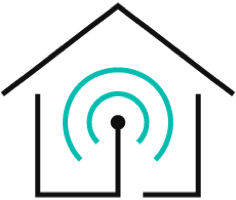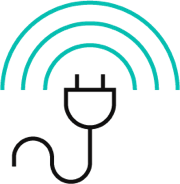Nowadays, human lives are completely dependent upon electricity, from shopping centers to residential buildings. Almost all of our infrastructure and daily activities are directly or indirectly reliant upon electric power. Any disruption in the energy supply can halt our way of life. That’s why you should always have a reliable power backup for your home at all times, especially if you reside in areas that are affected by natural disasters where power cuts are pretty common. Today, we will provide you with an in-depth guide on power backup and how you can prepare your home in the event of long power cuts. Let’s dive right in!
- Definition and Advantages of Home Backup Power
- Types of Home Power Backup
- How Much Backup Power Do I Need for My Home?
- How Do I Choose a Power Backup for My Home?
- EVVR Energy Monitoring Smart Plug & Relay - DIY Your Own Home Energy Monitor
Definition and Advantages of Home Backup Power
Power backup refers to electrical devices that provide instant power in the event of a blackout. Power backups are designed to conserve energy when grid power is on and resupply the stored energy when grid power is disrupted due to maintenance or natural calamities. Since the weather is becoming more and more hostile, thanks to our lack of understanding and abuse, the importance of having a quality power supply for your home is becoming increasingly popular. Moreover, many people are deciding to live a nomadic off-grid lifestyle, which also requires a healthy supply of energy backup. Let’s explore some benefits of home backup power:


Instant Power Production
One of the biggest benefits of power backup is that it offers you instant power. In an age when we’re solely dependent on electric energy, blackouts bring extreme difficulties to our lives. And that’s where power backups such as IPS or UPS can help you. They would keep the appliances running for a certain period.
Maximizing the Lifespan of Electric Devices
Sometimes sudden power cuts or subtle ups and downs in the voltage can severely damage electric devices. Stabilizers help maintain a consistent current flow and reduce such disruptions from happening, maximizing the lifespan of your electric devices.
Let You Live Off-grid
You must consider a sustainable power backup system if you want to live a truly solitary or nomadic lifestyle. When you’re traveling city after city in your campervan, having a quality backup will supply the much-needed energy to run air conditioners/heaters, stoves, and lights on board.
Types of Home Power Backup
There are different types of power backups available right now. Let’s explore some of them:
Battery Power Backup
Battery backups are battery-powered energy backup systems that provide uninterrupted power in the occasion of a blackout. One of the biggest benefits of battery-powered backup is that it’s super clean and doesn't come with any noise or smoke. However, battery-powered backup systems such as UPS or IPS have a low runtime, and the initial cost can sometimes be a bit too much for some. Another issue with battery power backup is that you may have to change the battery after some time. However, you won’t have to change the batteries every week. A quality battery can run up to 3-4 years.
Gas Power Backup
Gas power backups use gas as their main source of energy in the event of a blackout. A gas-powered power backup is a backup power system that runs on gasoline or natural gas. These systems typically use an internal combustion engine to generate electricity, which is then used to power electrical devices and appliances. Gas-powered backup systems are commonly used in homes, businesses, and other settings where a reliable source of backup power is required.
High maintenance and refueling costs are one of the biggest issues with gas power backups.
Solar Power Backup
A solar power backup system uses solar panels to convert sunlight into electricity, which is then stored in batteries for later use. These systems are environmentally friendly and can provide backup power for smaller systems or devices.
Generator Power Backup
A generator backup system uses an internal combustion engine to generate electricity, which is then used to power electrical devices and appliances. These systems are typically used to provide backup power for larger systems or devices and are often used in commercial or industrial settings.
Wind Power Backup
A wind power backup system uses wind turbines to generate electricity, which is then stored in batteries for later use. These systems are environmentally friendly and can provide backup power for smaller systems or devices. However, they require consistent wind to operate effectively.

Battery backup power supply for home is an essential component of a reliable power backup system. They come in different sizes and capacities, and you need to choose one that suits your power needs. Solar power backup systems for homes are gaining popularity, as they offer a sustainable and eco-friendly alternative to traditional backup systems. Home backup power systems also come in different types, such as standby generators, which automatically turn on when the grid power goes out, and portable generators, which you can move around to different locations. When choosing the best power backup for home, you need to consider factors such as the size of your home, the number of appliances you need to power, and your budget. It's also important to calculate how much backup power you need to ensure that you have enough energy to last through extended power outages.
How Much Backup Power Do I Need for My Home?
The amount of backup power you need for your home depends on several factors, such as the size of your home, the number and types of electrical devices you need to power during an outage, and how long you want your backup power to last.
One way to estimate the amount of backup power you need is to add up the wattage of all the devices you want to power during an outage. This can include things like lights, refrigerators, freezers, sump pumps, and medical equipment. Once you have a total wattage, you can use this to determine the size of backup generator or battery system you need.

As a general rule of thumb, a backup generator that can produce at least 5,000 watts of power is sufficient for most homes. However, if you have larger power needs or want to power more devices during an outage, you may need a larger generator. Similarly, a battery backup system that can provide at least 1,000 watts of power is usually sufficient for most small to medium-sized homes.
It's also important to consider how long you want your backup power to last. If you only need backup power for a few hours, a smaller generator or battery backup system may be sufficient. However, if you anticipate longer outages or want to be prepared for extended power loss, a larger backup power system with more fuel or battery capacity may be necessary.
How Do I Choose a Power Backup for My Home?
There are several ways to choose a power backup for your home. Here are some things you must consider:
Noise, Pollution, And Local Legal Requirements
One thing that many people forget about when getting a power backup system or generator is the issue of noise, pollution, and whether the generator is allowed to be run in the locality. Different states have different legal frameworks in place regarding using generators. Having a noise level over 55 dB would render your generator useless in most residential areas since most states don’t allow it. The same goes for the level of smoke it may produce. These issues aren’t serious for battery-powered backups, though, because they don’t produce noise nor do they emit smoke.
Clean Energy is Always a Plus
By clean energy, we mean backups that don’t emit smoke or create noise. That’s why we always prefer battery-powered backups over gas or oil-powered generators. You can install them anywhere you like without any risks whatsoever.
Go for Renewable Energy
If you didn’t know, we’re amidst an energy crisis that started shortly after the COVID-19 pandemic, and it’s still ongoing. We don’t have much authority or control over the grid power. That’s why it’s a pertinent move to go for a completely self-sustaining energy infrastructure. Since it gives you much more freedom and self-reliance, many households are gradually joining the solar revolution. The best thing about solar power is that you can generate power using sunlight and store it in your batteries for later use.
EVVR Energy Monitoring Smart Plug & Relay - DIY Your Own Home Energy Monitor
If you're looking to transform the way you use power backups, you might find EVVR energy monitoring smart plug & relay interesting. This device allows you to monitor how much energy the backup is consuming, helping you understand the right volume of usage to avoid depleting the backup system all at once. Additionally, the energy-monitoring smart plug enables you to control your power backup remotely, providing you with added flexibility.
Overall, our energy-t smart plug and relay will revolutionize the way you manage your power backup.
Final Thoughts
In this time of extreme power crisis, it's essential to consider a reliable power backup for your home. It will provide you with emergency power and protection during blackouts, as well as the much-needed support during natural disasters to keep the power running even when grid power is down.
We hope our guide has helped you learn more about power backups. However, if you have any other queries that need to be answered, please don't hesitate to reach out to us!
















